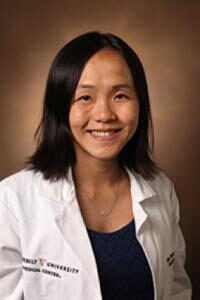by Mark Petrovic (M2)
 Dr. Jean Wassenaar, M.D. Ph.D. is a PGY-6 Cardiology Fellow in Vanderbilt’s Physician Scientist Training Program. Prior to coming to Vanderbilt, Dr. Wassenaar received her undergraduate degree in bioengineering from Johns Hopkins University and worked for Epic Systems during her gap year before matriculating at the University of California San Diego for her M.D. and Ph.D. in bioengineering. Her ongoing work in Dr. Meena Madhur, M.D. Ph.D.’s lab is focused on elucidating the role of the immune system in the pathogenesis of heart failure with preserved ejection fraction (HFpEF). She sat down with the MSTP newsletter to elaborate and reflect on her journey through MSTP and PSTP training.
Dr. Jean Wassenaar, M.D. Ph.D. is a PGY-6 Cardiology Fellow in Vanderbilt’s Physician Scientist Training Program. Prior to coming to Vanderbilt, Dr. Wassenaar received her undergraduate degree in bioengineering from Johns Hopkins University and worked for Epic Systems during her gap year before matriculating at the University of California San Diego for her M.D. and Ph.D. in bioengineering. Her ongoing work in Dr. Meena Madhur, M.D. Ph.D.’s lab is focused on elucidating the role of the immune system in the pathogenesis of heart failure with preserved ejection fraction (HFpEF). She sat down with the MSTP newsletter to elaborate and reflect on her journey through MSTP and PSTP training.
Dr. Wassenaar knew she wanted to pursue a Ph.D. or other graduate degree as a sophomore at Hopkins, but her interest in MSTP training was catalyzed by her experience working with her senior year Design Team. She likens this experience to a senior thesis, where a team of students is paired with clinician to solve a problem. Her team was paired with an Interventional Radiologist and sought to better understand why biliary drains being placed were continuously clogging. Working on this project Dr. Wassenaar came to the realization that scientists and engineers without medical training cannot easily understand clinical problems and their sequelae, as well as the limitations of their designs. She spent the year after graduating working for Epic Systems and applying to MSTPs with strong bioengineering programs which she found at UC San Diego.
Throughout her MSTP training Dr. Wassenaar knew she would pursue something heart-related because it made the most intuitive sense to her, and she considered a range of specialties including Pediatrics, Internal Medicine, Surgery, and Anesthesiology. Dr. Wassenaar completed her Ph.D. in Dr. Karen Christman’s lab, where she focused on cardiac tissue engineering. Eventually, Dr. Wassenaar decided on Internal Medicine as the logical choice based on her ambitions to pursue a research-oriented PSTP residency, and began her search for PSTPs with strong research and cardiology programs. She also welcomed her first child as a 4th year medical student, which strongly influenced her decision to continue training at a program in a smaller city.
When choosing where to pursue PSTP training, Dr. Wassenaar was impressed by the focus on physician-scientist training at Vanderbilt in the form of mentorship opportunities and financial support of physicians in the PSTP. She was also impressed by the opportunity to interview with the Chair of the Department of Medicine during the application process – a sign that the department values and takes PSTP training seriously and especially important to Dr. Wassenaar given that many PSTP graduates stay at the institution as faculty. Her advice for PSTP applicants was something she realized during her clinical fellowship in Cardiology: most programs will be clinically excellent (for Cardiology – high risk procedures, number of catheterizations, and diversity of patients, etc.), but not all will have the type of research you want to do or the same level of support for physician scientist training. Therefore, Dr. Wassenaar suggests that applicants broaden their horizon in terms of what they think top programs are.
In the PSTP at Vanderbilt, Dr. Wassenaar has completed two years of training in Internal Medicine, two years of Cardiology training, and is now in her second of three years of dedicated research time. Her ongoing work in Dr. Meena Madhur’s lab is focused on the role of the immune system in the pathogenesis of heart failure. Much of the molecular biology-based approach that the Madhur lab takes towards investigating this problem is new to Dr. Wassenaar, but this is by design. Dr. Wassenaar says she felt some frustration towards the end of her Ph.D. because engineers were well trained to design the solutions to problems, but less equipped to investigate questions like “why”. This pivot made the transition to research more challenging, but she looks forward to synthesizing this new skillset with her training as an engineer later in her career. Looking forward, Dr. Wassenaar’s clinical interest is in HFpEF and she plans to investigate the specific role of macrophages in its pathogenesis.
As she reaches the end of her training, Dr. Wassenaar says she would do it again despite its length. She says the training has afforded her the ability to “speak clinical”, to trust her own clinical judgement, and to enjoy that respect from others while also being able to think like a scientist. She recalls recently attending her first conference for 6 years since returning to clinical training, where she was reminded of how her perspective and thought process has been molded during physician scientist training. She says, “your grasp on what is relevant or how to make it relevant is just different”. Dr. Wassenaar looks forward to the dynamic nature of a career in research in parallel with her clinical responsibilities. “Research will never be the same on a daily basis”, she says. “The research questions will change. The challenges will change. You get to do what interests you and that’s the great thing about what we do”.
If physician scientist training weren’t enough, Dr. Wassenaar also welcomed her second and third children during residency and fellowship, respectively, and spends her time outside of training with her family.